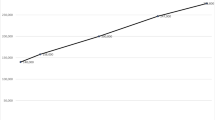Abstract
Colleges of agriculture are being forced to adapt to a changing world. The forces behind these changes affect all departments within the college. In this paper, the place of agricultural economics within the college and within the university is identified, the current situation facing the discipline is outlined, and strategies for responding to the forces of change are discussed. Three alternatives are available: continuation, termination, and metamorphosis. Different departments are likely to pursue different strategies. Some may disappear altogether or may be absorbed into the parent discipline, economics, or into the business school. Other departments may transform themselves into specialized sub-disciplines, such as natural resources or agribusiness departments. Still others may continue with little or no change. Whatever course is followed, strategic planning will surely be necessary.
Similar content being viewed by others
References
Bateman, Lanny. “Status of Agricultural Economics: A Fork in the Road or a Crooked Trail?”Southern Journal of Agricultural Economics, Vol. 19, No. 1, 1987, pp. 1–6.
Beattie, Bruce R. and Myles J. Watts. “The Proper Preeminent Role of Parent Disciplines and Learned Societies in Setting the Agenda at Land Grant Universities.” Paper presented at the annual meeting of the Western Agricultural Economics Association, July, 1987.
Boulding, Kenneth E. “Agricultural Economics in an Evolutionary Perspective.”American Journal of Agricultural Economics, Vol. 63, No. 5, 1981, pp. 788–95.
Broder, Josef M. and Rodney P. Deprey. “Monetary Returns to Bachelors and Masters Degrees in Agricultural Economics.”American Journal of Agricultural Economics Vol. 67, No. 3, 1985, pp. 666–73.
French, Charles E. and Bernard L. Erven. “Agri-business and Professional M.S. Degree Programs in Agricultural Economics in the United States.”American Journal of Agricultural Economics, Vol. 67, No. 5, 1985, pp. 1215–22.
Hite, James C. “Discussion: Agricultural Economics Undergraduate and Graduate Curricula: Are We Competitive?”Southern Journal of Agricultural Economics, Vol. 19, No. 1, 1987, pp. 55–7.
Huffman, Wallace E. and Peter Orazem. “An Econometric Model of the Market for New Ph.D.'s in Agricultural Economics in the United States.”American Journal of Agricultural Economics, Vol. 67, No. 5, 1985, pp. 1206–14.
Kohl, David M., Leonard A. Shabman and Herbert H. Stoevener. “Agricultural Transition: Its Implications for Agricultural Extension in the Southeast.”Southern Journal of Agricultural Economics, Vol. 19, No. 1, 1987, pp. 35–44.
Litzenberg, Kerry E. “Strategic Recruiting for Agricultural Economics Undergraduate Programs.” Paper presented at the annual meeting of the American Agricultural Economics Association, August, 1987.
Padberg, Daniel I. “Agricultural Economics: Finding Our Future.”American Journal of Agricultural Economics, Vol. 69, No. 5, Dec. 1987, pp. 883–889.
Parker, William Belmont.The Life and Public Services of Justin Smith Morrill. New York: Houghton Mifflin Co., 1924.
Schrimper, R. A. “Trends and Characteristics of Ph.D. Degrees in Agricultural Economics in the United States.”American Journal of Agricultural Economics Vol. 67, No. 5, 1985, pp. 1200–6.
Schuh, G. Edward. “Revitalizing Land Grant Universities.”Choices, Second Quarter, 1986, pp. 6–10.
Soth, Lauren. “Agricultural Economists and Public Policy,” inEconomic Analysis and Agricultural Policy, by Richard H. Day (ed.). Ames: Iowa State University Press, 1982.
United States Congress. “An Act Donating Public Lands to the Several States and Territories Which May Provide Colleges for the Benefit of Agriculture and Mechanic Arts.” Washington: Government Printing Office, July 2, 1862.
United States Department of Agriculture,Agricultural Statistics, 1986, Washington: Government Printing Office, 1986.
Williams, F. W. “Agricultural Economics Undergraduate and Graduate Curricula: Are We Competitive?”Southern Journal of Agricultural Economics, Vol. 19, No. 1, 1987, pp. 49–54.
Additional information
E. Wesley F. Peterson is an assistant professor in the Department of Agricultural Economics, Texas A&M University. He received his Bachelor's degree from the University of California (Berkeley) in 1967, a masters in public affairs from Princeton University in 1973 and a Ph.D. from Michigan State University in 1981. He taught agricultural economics in France before moving to Texas in 1983.
Fred J. Ruppel is an assistant professor in the Department of Agricultural Economics, Texas A&M University. He received a B.S. in Psychology and an M.S. in Labor and Industrial Relations at the University of Illinois before obtaining his Ph.D. in Economics from the University of Maryland in 1984. For the past four years he has been at Texas A&M where he teaches courses in macroeconomics, agricultural prices and international agricultural trade.
Daniel I. Padberg is professor and department head in the Department of Agricultural Economics, Texas A&M University. He received his Ph.D. from the University of California (Berkeley) in 1961 and has served on the faculties of the Ohio State University, Cornell University, the University of Illinois and the University of Massachusetts. he is past-president of the American Agricultural Economics Association.
The authors wish to thank Steve Fuller, Frank Edwards, Dave Bessler, and Kerry Litzenberg and two anonymous reviewers(Frederick Buttel and Patrick Madden—ed. note) for helpful comments.
All programs and information of the Texas Agricultural Experiment Station are available without regard to race, ethnic origin, religion, sex and age.
Rights and permissions
About this article
Cite this article
Peterson, E.W.F., Ruppel, F.J. & Padberg, D.I. Assessing agricultural education: Agricultural economics at a crossroads. Agric Hum Values 5, 26–33 (1988). https://doi.org/10.1007/BF02217645
Issue Date:
DOI: https://doi.org/10.1007/BF02217645




